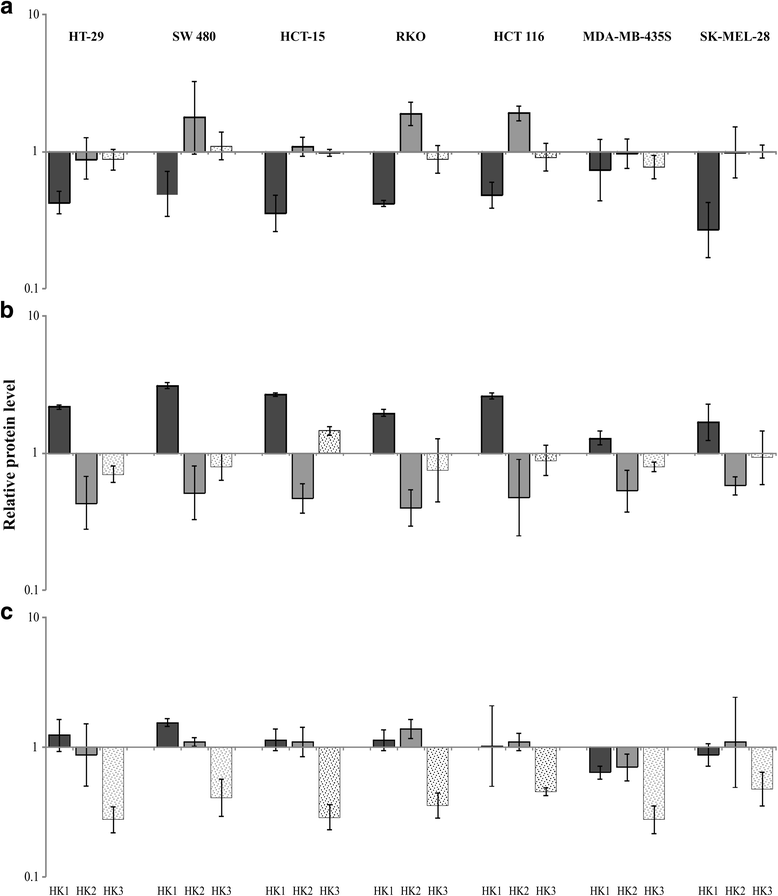Effect of lentivirus-mediated shRNA inactivation of HK1, HK2, and HK3 genes in colorectal cancer and melanoma cells
- PMID: 28105937
- PMCID: PMC5249010
- DOI: 10.1186/s12863-016-0459-1
Effect of lentivirus-mediated shRNA inactivation of HK1, HK2, and HK3 genes in colorectal cancer and melanoma cells
Abstract
Background: The switch from oxidative phosphorylation to glycolysis in proliferating cancer cells, even under aerobic conditions, has been shown first in 1926 by Otto Warburg. Today this phenomenon is known as the "Warburg effect" and recognized as a hallmark of cancer. The metabolic shift to glycolysis is associated with the alterations in signaling pathways involved in energy metabolism, including glucose uptake and fermentation, and regulation of mitochondrial functions. Hexokinases (HKs), which catalyze the first step of glycolysis, have been identified to play a role in tumorigenesis of human colorectal cancer (CRC) and melanoma. However, the mechanism of action of HKs in the promotion of tumor growth remains unclear.
Results: The purpose of the present study was to investigate the effect of silencing of hexokinase genes (HK1, HK2, and HK3) in colorectal cancer (HT-29, SW 480, HCT-15, RKO, and HCT 116) and melanoma (MDA-MB-435S and SK-MEL-28) cell lines using short hairpin RNA (shRNA) lentiviral vectors. shRNA lentiviral plasmid vectors pLSLP-HK1, pLSLP-HK2, and pLSLP-HK3 were constructed and then transfected separately or co-transfected into the cells. HK2 inactivation was associated with increased expression of HK1 in colorectal cancer cell lines pointing to the compensation effect. Simultaneous attenuation of HK1 and HK2 levels led to decreased cell viability. Co-transfection with shRNA vectors against HK1, HK2, and HK3 mRNAs resulted in a rapid cell death via apoptosis.
Conclusions: We have demonstrated that simultaneous inactivation of HK1 and HK2 was sufficient to decrease proliferation and viability of melanoma and colorectal cancer cells. Our results suggest that HK1 and HK2 could be the key therapeutic targets for reducing aerobic glycolysis in examined cancers.
Keywords: Colorectal cancer; Glycolysis; Hexokinases; Melanoma; Warburg effect; shRNA.
Figures



References
-
- Graziano F, Ruzzo A, Giacomini E, Ricciardi T, Aprile G, Loupakis F, Lorenzini P, Ongaro E, Zoratto F, Catalano V et al. Glycolysis gene expression analysis and selective metabolic advantage in the clinical progression of colorectal cancer. Pharmacogenomics J. 2016. doi:10.1038/tpj.2016.13. - PubMed
-
- Oparina NY, Snezhkina AV, Sadritdinova AF, Veselovskii VA, Dmitriev AA, Senchenko VN, Mel'nikova NV, Speranskaya AS, Darii MV, Stepanov OA, et al. Differential expression of genes that encode glycolysis enzymes in kidney and lung cancer in humans. Russ J Genet. 2013;49(7):707–16. doi: 10.1134/S1022795413050104. - DOI - PubMed
Publication types
MeSH terms
Substances
LinkOut - more resources
Full Text Sources
Other Literature Sources
Miscellaneous

